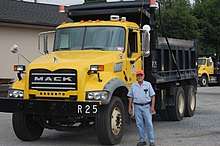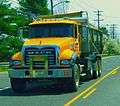Mack Granite
The Mack Granite is a series of heavy duty (Class 8) and severe service trucks built by Mack Trucks. It has a long, low-profile hood and a high-visibility cab. Designed as straight trucks for local construction, waste removal, and other vocational jobs it is also available as a semi-tractor. Introduced in 2001 it remains in production in 2020.
| Mack Granite | |
|---|---|
_(cropped).jpg) Concrete mixer | |
| Production history | |
| Type | Heavy-duty/severe service Conventional cab |
| Manufacturer | Mack Trucks |
| Built | 2001-present (2020) |
| Variants | Granite MHD |
| Predecessor | R and DM series |
| Weights | |
| Weight class | 8 |
| Loaded weight | 35,000–92,000 lb (16,000–42,000 kg) |
| Front axle | 12,000–23,000 pounds (5,400–10,400 kg) |
| Rear axle | 38,000 lb (17,000 kg) (single) 38,000–65,000 lb (17,000–29,000 kg) (tandem) 69,000 lb (31,000 kg) (tridem) |
| Dimensions | |
| Bumper to back of cab | 117.5 in (2.98 m) |
| Width | 100.5 in (2.55 m) |
| Height | 153 in (3.89 m) |
| Drivetrain | |
| Diesel engines | Mack MP7, MP8 Cummins ISL9 |
| CNG engine | Cummins Westport L9N |
| Transmissions | Mack 8-18-spd Eaton-Fuller 9-18-spd Allison 5-7-speed |
| Transfer case | 2-spd w/driven front axle |
| Chassis | |
| Front axle | Set forward, set back driven and twin-steer avail |
| Rear axles | Single, tandem, or tridem |
| Wheelbase | 149 to 304 in (3.78 to 7.72 m) |
| Drive layout | 4x2, 4x4, 6x4, 6x6, 8x4, 8x6 |
Design
The Granite is a long-hood conventional. It measures 117.5 from the bumper to the back of the cab. Designed for local use it usually has a day-cab but a 36" integral sleeper is available. Commonly a 6x4 (3 axles, 2 powered) there are packages from 4x2 (2 axles, 1 powered) to 8x6 (4 axles, 3 powered) and can be fitted with driven front, tandem-steer, lift, and extended trailing axles. Total loaded weight can be up to 92,000 pounds (42,000 kg) on four axles.
Advanced electronics are used for engine, chassis, and body controls, as well as maintenance. All trucks have ABS.
Mack builds their own major components (engines, transmissions, axles, and suspensions) and the Granite has specific packages for different applications. Most vendor components are also available but engine choice is very limited.
Engines
The Granite is available with two Mack diesels, a Cummins diesel, and a Cummins Westport natural gas engine. Between 2003 and 2005 an earlier generation Mack diesel was used.
The Mack MP7 is the base engine in the Granite. It is a 659 cubic inches (10.8 l) overhead cam turbocharged inline six-cylinder engine. It develops 325 to 434 horsepower (242 to 324 kW) and 1,200 to 1,560 pound force-feet (1,630 to 2,120 N⋅m) of torque.[1]
The Mack MP8 is the largest engine in the Granite. It is a 783 cubic inches (12.8 l) overhead cam turbocharged inline six-cylinder engine. It develops 434 to 505 horsepower (324 to 377 kW) and 1,460 to 1,760 pound force-feet (1,980 to 2,390 N⋅m) of torque.
The Cummins ISL9 used in the Granite MHD when weight is more important than power. It is a 543 cubic inches (8.9 l) turbocharged inline six-cylinder engine. It develops 350 horsepower (260 kW) and 1,115 pound force-feet (1,512 N⋅m) of torque.
The Cummins Westport L9N is a natural gas engine able to be set up to use either a CNG or LPG. It is a 543 cubic inches (8.9 l) turbocharged spark ignition inline six-cylinder engine. It develops 329 horsepower (245 kW) and 1,000 pound force-feet (1,400 N⋅m) of torque.
The Mack AMI series was used in the Granite between 2003 and 2005. It is a 728 cubic inches (11.9 l) turbocharged inline six-cylinder engine. It develops 300 to 370 horsepower (220 to 280 kW) and 1,200 to 1,480 pound force-feet (1,630 to 2,010 N⋅m) of torque.[2]
Transmissions
Both Mack and Eaton-Fuller have manual and automated shifting models. Manual transmissions have five or six main gears, extra ratios are made with different combinations of ranges. Allison transmissions are fully automatic.
Mack mDRIVE automated manual is the Granite's base transmission. It has no clutch pedal and shifts itself on demand. The driver can override it but it is normally driven in "D". It can have 12, 13, or 14-speeds. Other Mack manual transmissions have from 8- to 18-speeds.[3]
Eaton-Fuller UltraShift automated shifting systems are available on all of their transmissions from 9- to 18-speeds.
Allison RDS series 5- or 6-speed transmissions are available. The RDS is a fully automatic planetary gear transmission with a lock-up torque converter.
Frame
A ladder frame with beam axles is used. Normally there is a single undriven front axle on semi-elliptical leaf springs, but driven and tandem steer (popular in Canada) axles are available. The base rear suspension is a Mack tandem (two powered axles). Granites are also available with single and tridem (three driven) axles, different axle/suspension combination types. Lift axles can be installed by either Mack or bodybuilders. Up to three axles can be driven. Wheelbases are from 149 to 304 inches (380 to 770 cm)
A set-forward or set-back front axle is offered. A set forward axle, with the tires immediately behind a straight bumper, is used when overall length is limited or when wheelbase has to be as long as possible for bridge-formula laws. Set back axles, where the hood extends in front of the axle, are used when maneuverability is more important than length or weight distribution.
Dana-Spicer and Meritor supply air brakes, steering systems, driveshafts, and other components.
Axles and suspensions
Front axles are available from 12,000 to 23,000 pounds (5,400 to 10,400 kg), Dana-Spicer and Meritor driven axles up to 23,000 pounds (10,000 kg) are also available. Multi-leaf leaf springs are base, tapered leaves are optional.
Mack powered axles have the drive carrier on top of the housing. This lets the driveshafts be in line from the transmission to and between the axles at a higher level above the ground. With the higher level above the ground the driveshafts and u-joints are less prone to dirt and damage, important in on/off road construction.
Other powered axles are available from Dana-Spicer and Meritor. These have front mounted carriers and in tandems the two axle housings are different.
Single rear axles rated at 23,000 pounds (10,000 kg) are available from Mack and Meritor.
The Camelback tandem is the base rear suspension. The Camelback has multiple leaves that rock above the bogey pivot then curve down and under the axles. It is strong in on/off-road service. It is available in ratings of 38,000, 44,000, 52,000, and 65,000 pounds (17,000, 20,000, 24,000, and 29,000 kg).
The mRIDE tandem has tapered leaves that rock above the bogey pivot then go out and above the axles. Struts go from the bottom of the bogey pivot out and under the axle. They have more wheel travel and ground clearance than the camelback. They are rated at 40,000, 46,000, and 52,000 pounds (18,000, 21,000, and 24,000 kg).[4]
The Twin Y air suspension has trailing arms that fork to the rear and attach to both the top and bottom of the axle. There is an air bag behind the axle on each side and each axle is sprung individually. They are rated at 40,000 pounds (18,000 kg).[4]
Walking beams have low bogie pivots with a balance beam going out and under the axles. Any suspension is above the bogey pivot. They can have leaf springs, rubber load cushions, air bags, or be solidly mounted. Walking beams are very stable at low speeds and when stopped. Mack and Hendrickson models are available.
Vendor tandems from Chalmers, Hendrickson, Meritor, and RAYCO are rated at up to 46,000 pounds (21,000 kg).
Meritor tridems (three powered axles) rated at 69,000 pounds (31,000 kg) are needed for maximum weight trucks regardless of any other extra axles.
Applications
Mack has standard packages for dump, concrete mixer, roll-off, and rear loader bodies, as well as semi-tractor. Other packages can be special ordered.
Construction
The Granite, with its extra heavy-duty chassis, high ground clearance, and high-visibility cab, was designed to be operated on construction" job sites".
Dump trucks are the first standard packages. Typically 6x4 (three axles, two driven) lift axles are available. Body builders can add lift axles and extended trailing axles for higher weights.
Concrete mixers are operated on/off-road locally at high weights. Available driven front axles are often used on mixers. Mixers often can benefit from a set forward front axle and extended trailing axle for increased bridge formula weights.[5]
Other types like flatbeds, including those that self-unload by dumping or with their own crane, Volumetric concrete mixers, and cranes can use the strong chassis.
Refuse
Refuse is largely on-road use and doesn't need as much power as off-road use. Mack suggests that the Granite MHD with the lighter and less-powerful Cummins ISL9 engines be used.
Roll-off container trucks have a container that is raised in the front and slides off the back of the truck onto the ground. When a loaded box is carried it can be unloaded like a dump truck. They commonly haul construction debris but refuse containers are also left at commercial sites.
Rear-loading compactor bodies have a large hopper on the rear end. Typically a rear crew can load loose material, bins with assist, oversize pieces, and small containers. They are used for residential and light commercial pickup.[6]
Semi-tractor
There are semi-tractor packages but the Granite was designed primarily as a straight truck.
Snow plowing
In the northern United States snow-plowing is a severe service that the Granite is suited for. The Granite has high ground clearances as designed, Mack has an increased frame height option to give under-truck blades even more clearance. Reinforced front frame rail extensions are available. A number of cold-weather options include heated windshield, windows, mirrors, and mechanical components.[7]
Other uses
The Granite can also be built to custom designs for most local heavy-duty applications. Vocational, utility, heavy delivery, any application that needs a strong chassis.
Gallery
 Dump truck
Dump truck
fitted for snow plow- Concrete mixer
 Concrete mixer
Concrete mixer
with tandem steer_(cropped).jpg) Semi-tractor
Semi-tractor
with drop-deck trailer Roll-off container
Roll-off container_(cropped).jpg) Rear-loader
Rear-loader
refuse compactor.jpg) Snow plow with front and wing blades, de-icer tanks
Snow plow with front and wing blades, de-icer tanks.jpg) Road-railer
Road-railer- Box van
References
- "Road Test: Mack MP7 (from 2006)". Today's Trucking. August 1, 2014. Retrieved February 21, 2020.
- "Mack's Maxidyne require some re-learning (from 2003)". Construction Equipment. September 28, 2010. Retrieved February 21, 2020.
- "Mack mDrive HD 13-speed standard on Granite". FleetOwner. May 10, 2016. Retrieved January 11, 2020.
- "Mack introduces air suspension (includes mRide)". FleetOwner. January 29, 2013. Retrieved January 11, 2020.
- "Mack Granite Model offered for concrete mixers". FleetOwner. September 21, 2016. Retrieved January 11, 2020.
- "Mack adds Granite rear loader to refuse offerings". FleetOwner. November 25, 2013. Retrieved January 11, 2020.
- "Mack offers Granite with more clearance for underbody scrapers". FleetOwner. March 8, 2018. Retrieved January 11, 2020.
"Old dog, new trucks". FleetOwner. August 1, 2001. Retrieved January 11, 2020.
"Mack debuts axle-back Granite". Equipment World. March 7, 2005. Retrieved January 11, 2020.
Granite Axle Back 6x4 specifications (PDF). Mack Trucks. 2007. Retrieved January 15, 2020.
Body Builder General Information/Specifications (PDF). Mack Trucks. 2019. pp. 32–35, 65–70. Retrieved January 11, 2020.
"Granite specs". Mack Trucks. 2020. Retrieved January 11, 2020.
External links
| Wikimedia Commons has media related to Mack Granite Series. |